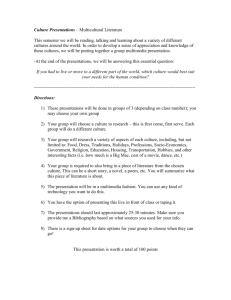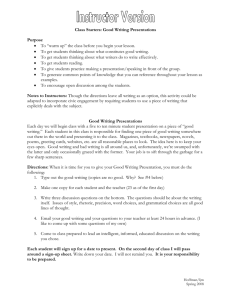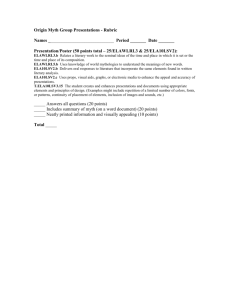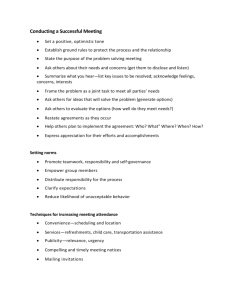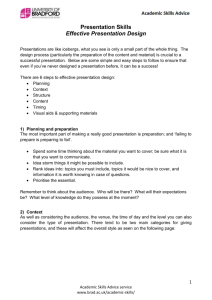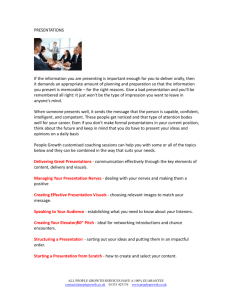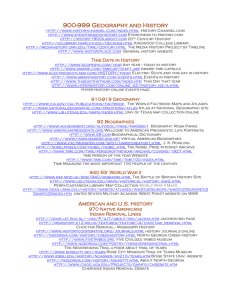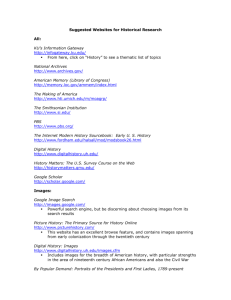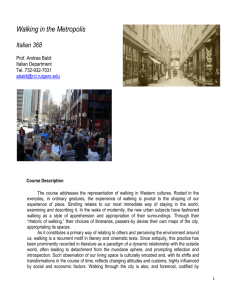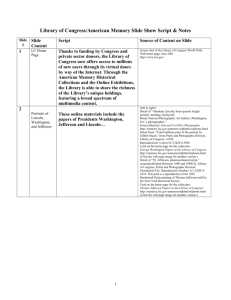Syllabus 2013
advertisement
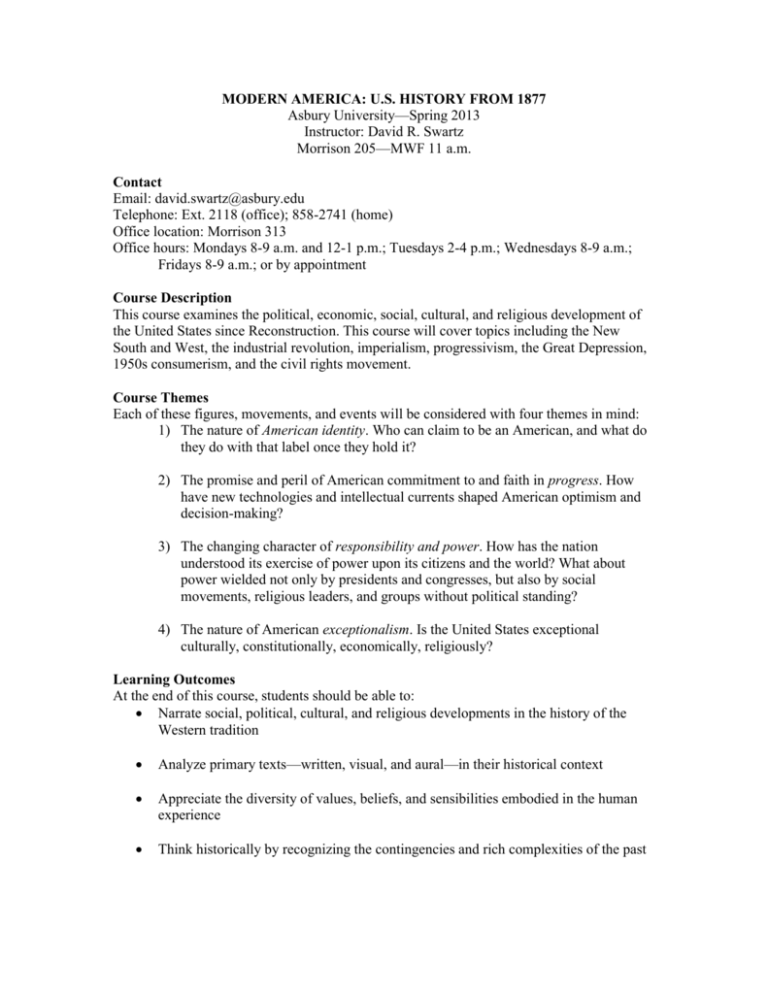
MODERN AMERICA: U.S. HISTORY FROM 1877 Asbury University—Spring 2013 Instructor: David R. Swartz Morrison 205—MWF 11 a.m. Contact Email: david.swartz@asbury.edu Telephone: Ext. 2118 (office); 858-2741 (home) Office location: Morrison 313 Office hours: Mondays 8-9 a.m. and 12-1 p.m.; Tuesdays 2-4 p.m.; Wednesdays 8-9 a.m.; Fridays 8-9 a.m.; or by appointment Course Description This course examines the political, economic, social, cultural, and religious development of the United States since Reconstruction. This course will cover topics including the New South and West, the industrial revolution, imperialism, progressivism, the Great Depression, 1950s consumerism, and the civil rights movement. Course Themes Each of these figures, movements, and events will be considered with four themes in mind: 1) The nature of American identity. Who can claim to be an American, and what do they do with that label once they hold it? 2) The promise and peril of American commitment to and faith in progress. How have new technologies and intellectual currents shaped American optimism and decision-making? 3) The changing character of responsibility and power. How has the nation understood its exercise of power upon its citizens and the world? What about power wielded not only by presidents and congresses, but also by social movements, religious leaders, and groups without political standing? 4) The nature of American exceptionalism. Is the United States exceptional culturally, constitutionally, economically, religiously? Learning Outcomes At the end of this course, students should be able to: Narrate social, political, cultural, and religious developments in the history of the Western tradition Analyze primary texts—written, visual, and aural—in their historical context Appreciate the diversity of values, beliefs, and sensibilities embodied in the human experience Think historically by recognizing the contingencies and rich complexities of the past Course Texts James W. Davidson and Mark H. Lytle, After the Fact: The Art of Historical Detection, Vol. 2 (McGraw-Hill, 5th edition) Jacob A. Riis, How the Other Half Lives: Studies among the Tenements of New York Miné Okubo, Citizen 13660 Eric Schlosser, Fast Food Nation: The Dark Side of the All-American Meal Selected primary source readings Evaluation Grading criteria: A (93-100); A- (90-92); B+ (88-89); B (83-87); B- (80-82); C+ (78-79); C (73-77); C- (70-72); D (60-69) Plagiarism and cheating: Plagiarism, which is the use of another person’s words or ideas without proper documentation, will not be tolerated. Plagiarized assignments will receive no credit. 1. Two exams (50%) o Purchase blue books from the bookstore. 2. Project (25%) o Give a ten-minute presentation that defends an argument with evidence from either an image or person and its historical context. Bring two written copies of your presentation (outline, notes, and documentation) to class (one for me; one for you). Late assignments will be reduced one letter grade each class period late. 3. Attendance and participation (25%) o Participation and in-class exercises: Participation is important in the success of this class and in student learning. Evaluation will be based on thoughtful questions, insightful comments, and verbal participation in small group discussions. o Attendance: Each absence after three unexcused absences will reduce the class participation component by one-half of a letter grade. o Quiz Schedule Week One: The Bottom Rail and the Telling of American History January 7 January 9 January 11: “The View from the Bottom Rail,” After the Fact Week Two: Railroaded: National Expansion in the South and West January 14: Turner, “Frontier in American History” (1893) January 16: “Wyoming Gunfight: An Attack on Chinatown,” (1885) January 18: Cobb, “An Unreconstructed Southerner” (1868) Week Three: Machinery Hall and the Rise of Industrialization January 21: MLK Day—no classes January 23: “Engineer Taylor Fashions the Ideal Worker” (1910); “The World Before Him” (1880) January 25: Quiz; Twain, “Gimme a Break!” (1879) Week Four: New York City and the Rise of the Metropolis January 28: Riis, How the Other Half Lives (1890) January 30 February 1: “The Mirror with a Memory,” After the Fact Week Five: Teddy Roosevelt and Progressivism February 4: Selections from Josiah Strong, Our Country (1885) February 6: Sanger, “The Case for Birth Control” (1924) February 8: Selections from The Jungle (1906); “USDA Government Inspected,” After the Fact Week Six: Birth of a Nation and the Limits of Progressivism February 11 February 13: Eliot, “The Love-Song of J. Alfred Prufrock” (1920) February 15: Primary source exercise from “The Crisis” Week Seven: The Beast of Berlin and World War I February 18: Midterm exam February 20: Selections from Creel, How We Sold America (1920) February 22: “Sacco and Vanzetti” After the Fact Week Eight: Major League Baseball and the Rise of Mass Culture February 25: Wolfe, “The Benevolent Brotherhood of Baseball Bugs” (1923) February 27: Newspaper assignment; browse http://memory.loc.gov/ammem/sgphtml/sashtml/sashome.html March 1: Williams, “The Crowd at the Baseball Game” (1921); Selections from The Great Gatsby (1925) Week Nine: March 4: Presentations March 6: Presentations March 8: Presentations SPRING BREAK Week Ten: Migrant Mother and the Great Depression March 18 March 20: Meridel Le Sueur, “Women on the Breadlines” (1932) March 22: “Dust Bowl Odyssey,” After the Fact; browse http://rs6.loc.gov/ammem/fsahtml/fahome.html and http://memory.loc.gov/ammem/afctshtml/tshome.html Week Eleven: Citizen 13660 and the Limits of World War II March 25 March 27: Miné Okubo, Citizen 13660 (1946) March 29: Easter Break Week Twelve: Wonder Bread and the American Dream in the 1950s April 1: Easter Break April 3: William H. Whyte, Jr., excerpts from The Organization Man (1956); “The Organization Kid,” Atlantic Monthly (2001) April 5: “From Rosie to Lucy,” After the Fact Week Thirteen April 8: Presentations April 10: Presentations April 12: Presentations Week Fourteen: Albany, Birmingham, and the Triumph of Civil Rights April 15: King, “Letter from Birmingham Jail” (1963) April 17: Wallace, “The Civil Rights Movement: Fraud, Sham, and Hoax” (1964) April 19 Week Fifteen: The Big Mac and the Dilemmas of Modernity April 22: “The Body in Question,” After the Fact April 24: Fast Food Nation (2001) April 26 Final Examination: 8 a.m., Thursday, May 2, 2013


